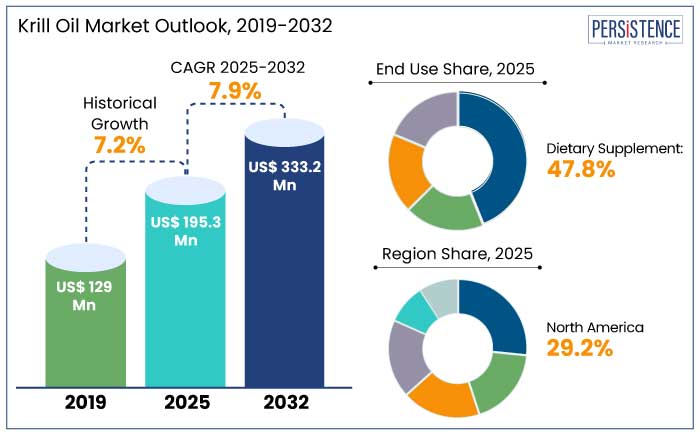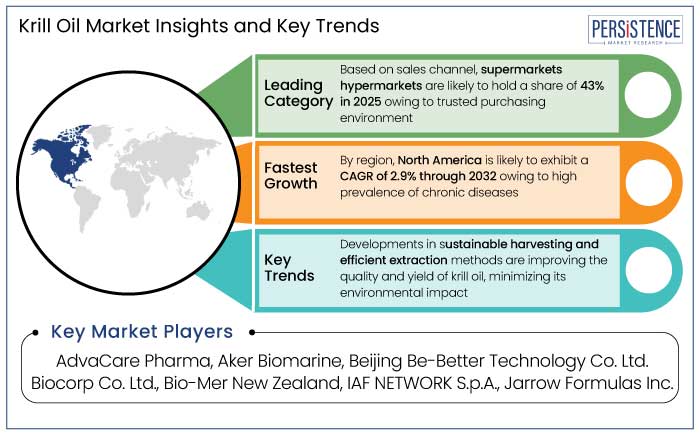ID: PMRREP6721| 182 Pages | 29 Jan 2025 | Format: PDF, Excel, PPT* | Food and Beverages

The global krill oil market is predicted to reach a size of US$ 195.3 Mn by 2025. It is anticipated to showcase a CAGR of 7.9% during the forecast period to attain a value of US$ 333.2 Mn by 2032.
The industry is witnessing a rising preference for krill oil over fish oil owing to its higher absorption rates and fewer side effects, like the fishy aftertaste. As the demand for omega-3 fatty acids, essential for heart, brain, and joint health, continues to grow, krill oil supplements are estimated to gain popularity among health-conscious consumers.
The oil is finding increasing use in pharmaceutical formulations to treat inflammation, arthritis, and cardiovascular diseases. Atheletes and fitness enthusiasts are propelling demand for krill oil as it can decrease inflammation, improve endurance, and support muscle recovery.

Key Highlights of the Industry
|
Market Attributes |
Key Insights |
|
Krill Oil Market Size (2025E) |
US$ 195.3 Mn |
|
Projected Market Value (2032F) |
US$ 333.2 Mn |
|
Global Market Growth Rate (CAGR 2025 to 2032) |
7.9% |
|
Historical Market Growth Rate (CAGR 2019 to 2023) |
7.2% |
Krill oil market in North America is estimated to hold a share of 29.2% in 2025. The region has one of the largest consumer bases for omega-3 supplements, driven by a growing focus on preventative healthcare. For example,
Increasing preference for phospholipid-based omega-3s, which are better absorbed by the body, has accelerated the adoption of krill oil over traditional fish oil. Increasing awareness regarding the health benefits of krill oil is further propelling demand.
North America has a higher prevalence of chronic diseases like cardiovascular diseases (CVDs) and arthritis.
The region is home to some of the well-established pharmaceutical and nutraceutical companies. This enables development and marketing of innovative krill oil-based products.
Dietary supplements are projected to hold a share of 47.8% in 2025. Consumers are increasingly adopting preventative healthcare measures, leading to higher consumption of dietary supplements like krill oil. For example,
Increasing demand for functional foods has led consumers to seek products that deliver targeted health benefits. Dietary supplements containing krill oil are often recommended for managing chronic health conditions.
Supermarkets/hypermarkets are predicted to hold a share of 43% in 2025. These outlets provide one-stop shopping experiences, where consumers can purchase krill oil products alongside groceries and other daily essentials. They are easily accessible in urban and suburban areas, catering to a diverse consumer base.
Supermarkets/hypermarkets provide ample shelf space and attractive displays, boosting product visibility and encouraging impulse buying. Consumers often trust these outlets as reliable sources for purchasing branded krill oil products. The assurance of product authenticity is a key factor influencing their choice.
Supermarkets stock various krill oil products, including capsules, soft gels, and liquid formulations, catering to a range of consumer preferences. They also feature products across price points, appealing to both budget-conscious buyers and those seeking premium offerings.
Potential growth in the global krill oil industry is predicted to be driven by stringent environmental regulations pushing companies to adopt unique sustainable harvesting practices. This is likely to create a competitive advantage for eco-conscious brands.
The assessment period is likely to witness a continuous demand for MSC-certified products. Rising applications in sport nutrition, infant nutrition, and cognitive health products is likely to further bolster growth.

The krill oil market growth was steady at a CAGR of 7.2% during the historical period. Production and consumption of krill oil witnessed significant growth during the period. There was a notable increase in demand for capsules and soft gels in the dietary supplements industry. For instance,
The krill oil industry benefitted from increasing consumer preferences for sustainable and eco-friendly products. Krill oil was increasingly used in pet supplements, especially to obtain joint health and improved coat conditions in dogs and cats.
The forecast period is likely to witness rapid growth owing to increasing consumer spending on health supplements. Growing awareness regarding the benefits of omega-3 are likely to spur demand.
Premiumization and Personalized Nutrition
Premium krill oil products often boast higher levels of essential omega-3 fatty acids and antioxidants. These provide health benefits like enhanced cardiovascular health and stronger immunity. Companies are focusing on high-purity and odorless formulations to appeal to health-conscious and discerning consumers. For example,
Consumers are seeking krill oil supplements that address their specific health concerns like heart health, cognitive function, and joint support. Businesses are hence offering personalized subscription models and curated supplement plans based on health assessments. For instance,
Rising Demand for Sports Nutrition
Omega-3 fatty acids found in krill oil assist in decreasing exercise-induced inflammation, which is essential for athletes to prevent injuries and maintain long-term performance. The oil is popular for its ability to protect joints from wear and tears, which is a common concern for endurance and weight-training athletes. For example,
Rising gym memberships and at-home fitness solutions are increasing the preference for natural supplements to improve recovery and support joint health.
Taste and Odor Issues
Krill oil contains high levels of phospholipids and polyunsaturated fatty acids, which contribute to its characteristic fishy taste and smell. Exposure to air can lead to oxidation, intensifying the unpleasant odor and taste.
Liquid krill oil formulations are particularly prone to taste and odor issues compared to encapsulated forms. Although soft gel capsules mask the taste, some users still report a fishy aftertaste upon burping after consumption.
Technological Innovations in Extraction Techniques
Enzymatic processes are increasingly being used to break down krill biomass, enhancing the yield and bioavailability of the extracted oil. This process ensures higher concentration of phospholipids and improved absorption rates for omega-3 fatty acids.
New extraction techniques focus on maximizing the retention of phospholipids, which are crucial for the superior bioavailability of krill oil.
Novel extraction technologies now prioritize the preservation of astaxanthin, a powerful antioxidant naturally present in krill oil. For instance,
Increasing Preference for Natural and Sustainable Products
Consumers are increasingly seeking natural sources of omega-3 fatty acids, as these are perceived to be free from synthetic additives and chemicals. For example,
Krill oil is perceived as a sustainable omega-3 source compared to overfished species. Sustainable harvesting practices in Antarctic waters have contributed to its popularity.
Certifications like Marine Stewardship Council (MSC) and Friend of the Seas (FOS) have bolstered consumer trust in krill oil brands. Rise in consumer skepticism toward synthetic and chemically processed supplements is steering demand toward naturally derived options like krill oil.
Companies in the krill oil market are investing in sustainable harvesting methods to minimize the environmental impact of krill fishing. Aker BioMarine has adopted novel technology to monitor and limit krill harvesting, maintaining compliance with the Marine Stewardship Council (MSC) certification.
Businesses are also committing to reducing their carbon footprint to align with the global sustainability goals. They are focusing on enhancing the bioavailability of krill oil through new formulations that offer superior absorption compared to conventional triglyceride-based fish oil.
Manufacturers are using advanced flavor masking and encapsulation techniques to address the ‘fishy taste’ concern and improve consumer acceptance. They are also combining krill oil with other ingredients like astaxanthin, vitamins, and coenzyme Q10 to create multifunctional health supplements.
Recent Industry Developments
The market is anticipated to reach a value of US$ 333.2 Mn by 2032.
Ability of krill oil in decreasing pain and swelling while preventing blood from easily clotting is set to drive demand.
North America is anticipated to emerge as the leading region with a share of 29.2% in 2025.
Prominent players in the market include AdvaCare Pharma, Aker Biomarine, and Beijing Be-Better Technology Co. Ltd.
The market is predicted to witness a CAGR of 7.9% throughout the forecast period.
|
Attributes |
Detail |
|
Forecast Period |
2025 to 2032 |
|
Historical Data Available for |
2019 to 2023 |
|
Market Analysis |
US$ Million for Value |
|
Key Regions Covered |
|
|
Key Market Segments Covered |
|
|
Key Companies Profiled in the Report |
|
|
Report Coverage |
|
|
Customization and Pricing |
Available upon request |
By End Use
By Sales Channel
By Region
Delivery Timelines
For more information on this report and its delivery timelines please get in touch with our sales team.
About Author